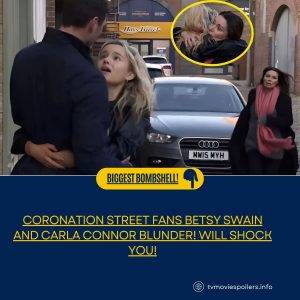When Coronation Street fans heard that Julie Carp (played by the brilliant Katie Cavannah) would be making a return to Weatherfield, few could have anticipated
the shocking and heart-wrenching turn her storyline would take. The beloved character, known for her vibrant spirit and quirky charm, would return to the cobbles,
but there was something different about her this time—something hidden behind her warm smile. What viewers soon learned, however, was far darker and more devastating
than anyone could have predicted: Julie was dying. Diagnosed with stage 4 sarcoma, a rare and aggressive form of cancer, Julie had only months left to live.

In a move that would send shockwaves through her loved ones, Julie made the agonizing decision to keep her diagnosis a secret from everyone she cared about, most notably her sister, Eileen Grimshaw (Sue Cleaver). As the audience watched this emotionally complex narrative unfold, it was clear that Julie’s choice to shield her family and friends from the pain of her impending death was one born of deep love. However, as is often the case in the dramatic world of Coronation Street, the truth would eventually come to light in the most unexpected and devastating way.
Julie’s secret—one that had weighed heavily on her—was uncovered in a brutal moment of emotional outpouring during a confrontation between Eileen and Debbie Webster (Sue Devaney). Tensions were already running high between the two women, but when Eileen, who had reached the breaking point, blurted out her sister’s diagnosis, the impact was seismic. The revelation stunned not only Eileen but also Brian Packham (Peter Gunn), Julie’s former partner, and the man she had once left Weatherfield with in 2015 to start a new life. Brian, who had returned to the cobbles alone, bewildered by the silence surrounding their split, was blindsided by the news that Julie had been battling such a brutal illness all on her own.
As Julie’s heart-wrenching diagnosis hung in the air, Brian was left devastated and confused. How could the woman he had once planned a future with not have told him the truth? His emotions were a complex mixture of anger, betrayal, and deep sorrow. Why hadn’t she shared this with him? Julie, tearfully admitting to her fear, finally revealed the core of her decision: she was terrified. Terrified of changing the way Brian saw her, scared of facing the inevitable end of her life alone. It was a raw and vulnerable moment for Julie, one that exposed not just her physical fragility but the emotional and mental toll her illness had taken on her.
“I’m the strongest person I know,” Brian whispered to Julie, attempting to offer comfort, but it was in a quiet moment of reflection with Eileen that Julie’s walls fully came down. Sitting together, she confessed that, despite her outward strength, she was consumed by fear. She wasn’t the person she had tried to portray to those around her—she was terrified, and the weight of that fear had driven her to keep her diagnosis a secret for as long as possible.
Julie’s vulnerability in these moments was a powerful reminder of how the fear of facing death can impact not just the person who is ill but those around them. She was fighting not just a physical battle but an emotional one, and in doing so, she alienated the people who most wanted to be by her side in her final days.
As the days passed and Julie began to process the fallout from her confession, she made an important decision about how she would spend the remainder of her time. Determined to live the last months of her life without letting sorrow define her, Julie decided to take a trip to the Lake District—a place of beauty, peace, and respite. With money raised by her friends, Julie hoped to escape the harsh realities of her illness and find solace in the serene landscapes of the countryside. It was her attempt to experience something pure and untainted before the inevitable end.
However, as with so many Coronation Street plotlines, fate had other plans. The dream of a quiet escape to the Lake District was abruptly shattered when the mini bus that was supposed to take her and her friends broke down. The trip was cancelled, leaving Julie’s last hope for peace dashed. Yet, in a moment of grace, Julie found herself surrounded by the people she loved most, and with tears in her eyes, she whispered, “It doesn’t matter. I’m with the people I love.” This quiet, intimate scene captured the heart of Julie’s journey—a woman finding peace not in grand gestures or beautiful landscapes, but in the simple, profound connections she had made with those who mattered most.
It was during this moment of vulnerability and acceptance that Brian, still wrestling with his own regrets, finally spoke the words he had been holding back for so long. As Julie’s hand rested in his, Brian looked into her eyes and confessed his love for her, acknowledging that no matter how little time they had left together, he wanted to walk beside her, through whatever came next. “I still love you,” he told her, his voice breaking with emotion. The words were long overdue, but they came just in time for Julie to hear them and feel the depth of the love that had never truly faded.
In this quiet but powerful exchange, Julie Karp found something she had feared she might never have again: the certainty that she was not alone. Brian’s declaration of love, simple yet profound, gave her the peace she had so desperately sought. The unspoken bond that had once existed between them, now revived and strengthened in the face of tragedy, would remain in her heart until the end.
Despite her illness, despite the looming shadow of death, Julie’s final days were marked not by despair, but by a sense of connection and love. The characters who had been a part of her life for so long—Eileen, Brian, and even Roy Cropper (David Neilson), who offered her comfort in the form of a heated wheat bag as a gesture of care—came together to surround Julie with warmth and kindness. In her final moments, Julie was able to feel the love and support of her family and friends, and this, perhaps, was the greatest gift she could have received.
Julie’s storyline, a poignant and emotional journey that touched on themes of fear, love, and the acceptance of mortality, was a testament to the strength of the human spirit. It reminded viewers that no matter how difficult life becomes, the connections we make with others can provide us with the strength we need to face even the most harrowing challenges.
For Julie Carp, her story may have ended in tragedy, but it also ended with love—a love that transcended the fear of death and gave her the courage to embrace her final days with grace. In her farewell to Weatherfield, Julie left a legacy of strength, vulnerability, and the enduring power of human connection.





